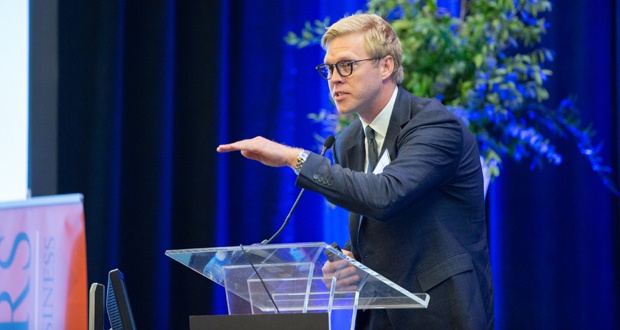
Original article appeared in the Journal Record on May 11, 2018 and is accessible here.
By: Sarah Terry-Cobo, The Journal Record, May 11, 2018
OKLAHOMA CITY – Evan Anderson said he’s trying to put out the proverbial dumpster fire that is public oil and gas records. The Oseberg CEO and co-founder said his main challenge to providing services to the oil and gas industry isn’t that there are tens of thousands of unsearchable documents or that more than half aren’t available online.
His issue is cultural. Technology adoption and the use of computer algorithms to find patterns isn’t generational, he said. Even though he grew up in the Napster age in which he traded beer for MP3s, not everyone in his generation has adapted, he said.
“I thought when my peers got into the industry, computer science would take off,” he said. “But more than anything, it is cultural. The (oil and gas) industry is just starting to wake up to realize that data has a very strong role in operations.”
But the heads of two petroleum engineering programs disputed the notion that their graduates aren’t prepared to handle modern data analytics challenges. University of Oklahoma Mewbourne College of Earth and Energy Dean Mike Stice said his undergraduates learn on computer software donated by large oil companies. If they want to manipulate any of the data, they have to know how to write and change computer code. University of Tulsa McDougall School of Petroleum Engineering professor and department Chairman Mustafa Onur said computer applications courses are required, and students can learn languages such as Python, C++ and MATLAB.
Anderson addressed about 200 attendees Thursday at the Oklahoma State University Spears School of Business’ 12th annual Energy Conference, held at the Cox Convention Center. His company gathers public regulatory and land lease documents for Oklahoma, Texas and New Mexico, and creates computer algorithms to identify trends before drillers make announcements public.
Computer programs pick out anomalies and spot trends months in advance. His workers were able to identify Continental Resources Inc.’s big play, the Springer SCOOP, one month before the company made a public announcement in fall 2014.
“(The information is) freely available, but expensive to extract, so we figure out how to get all this,” Anderson said.
It’s important that the next generation of petroleum engineers is willing to learn another skill: computer software coding. He said when he speaks to petroleum engineering classes, many students admit they’re intimidated by coding. But it doesn’t have to be that way.
“You know what code is?” Anderson said. “It’s (like) Spanish. It’s just another language.”
Some oil companies have embraced data analytics. EOG Resources Inc. is like the Apple of oil and gas drillers, Anderson said. The company has reached out to both OU and TU for student interns with computer coding experience. One of Stice’s former petroleum engineering students wrote him an email on Thursday and said she was looking for two interns who are studying petroleum engineering and can do data analysis.
“They pay well, and I promise I will have no trouble filling those internships,” Stice said.
Onur said one of his students got an EOG internship because the person knows Python. That gives the student the opportunity for a full-time job at the company after graduation, Onur said.
TU offers advanced programming classes for its petroleum engineering students, including computer applications for complex petroleum engineering problems. He said he plans to expand the data analytics courses available for the coming year because it is so vital to working in the industry.
Stice said the coursework OU students take gives them enough experience to have a minor in big data and information technology. During the downturn, many of his students found data analytics jobs, not engineering jobs, at ExxonMobil and Pioneer Resources because they had programming experience. The university has alumni who have made a living writing computer code, he said.
“That is becoming more and more popular, and frankly, it’s starting to pay more than petroleum engineers,” Stice said. “I see that as a very legitimate career path.”
Anderson said computer software education must start much earlier. If the state is serious about changing the culture and creating science, technology, engineering and math, or STEM jobs, computer coding should be taught from the time children enter school. Similarly, learning Spanish is much harder as a college student than as a first-grader.
“If you targeted six-year-olds, you can measure the skills they learn year over year; it is quantifiable,” he said. “So by the time these kids are 18, they have 12 years of coding experience and they are employable, right out of high school.”
“Don’t expect immediate results, this takes a long-term commitment,” Anderson said. “And (the culture gap) exists all over the world.”
